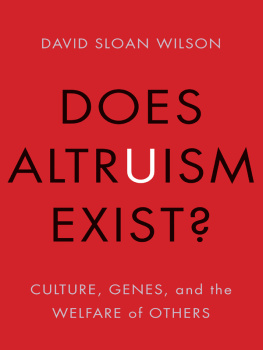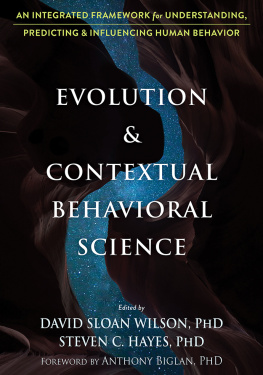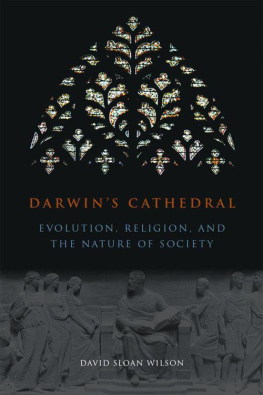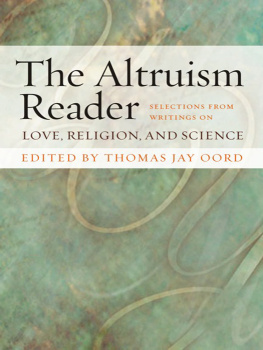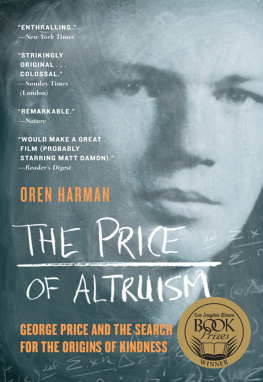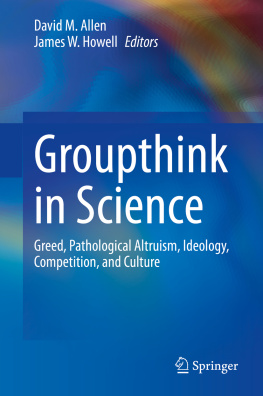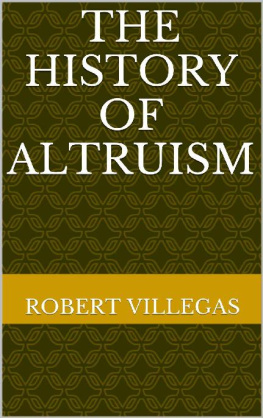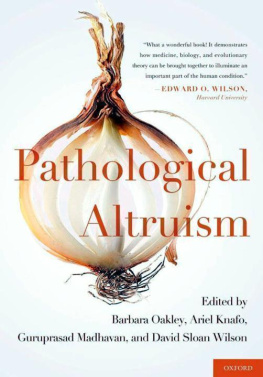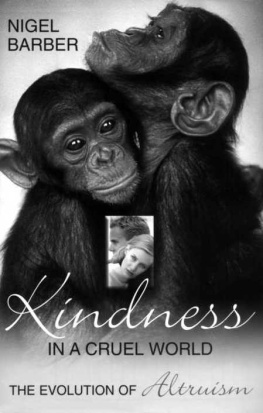
FOUNDATIONAL QUESTIONS IN SCIENCE
At its deepest level, science becomes nearly indistinguishable from philosophy. The most fundamental scientific questions address the ultimate nature of the world. Foundational Questions in Science, jointly published by Templeton Press and Yale University Press, invites prominent scientists to ask these questions, describe our current best approaches to the answers, and tell us where such answers may lead: the new realities they point to and the further questions they compel us to ask. Intended for interested lay readers, students, and young scientists, these short volumes show how science approaches the mysteries of the world around us, and offer readers a chance to explore the implications at the profoundest and most exciting levels.
Does Altruism Exist?
Culture, Genes, and the
Welfare of Others

David Sloan Wilson
Yale UNIVERSITY PRESS
NEW HAVEN AND LONDON

Templeton Press
Copyright 2015 by David Sloan Wilson
All rights reserved.
This book may not be reproduced, in whole or in part, including illustrations, in any form (beyond that copying permitted by Sections 107 and 108 of the U.S. Copyright Law and except by reviewers for the public press), without written permission from the publishers.
Yale University Press books may be purchased in quantity for educational, business, or promotional use. For information, please e-mail sales.press@yale.edu (U.S. office) or sales@yaleup.co.uk (U.K. office).
Designed by Gopa & Ted2, Inc.
Set in Hoefler Text by Gopa & Ted2, Inc.
Printed in the United States of America.
Library of Congress Control Number: 2014942467
ISBN 978-0-300-18949-0 (cloth: alk. paper)
eISBN: 978-0-300-20675-3
A catalogue record for this book is available from the British Library.
This paper meets the requirements of ANSI/NISO Z39.48-1992 (Permanence of Paper).
10 9 8 7 6 5 4 3 2 1
To altruists everywhere,
defined in terms of action
Contents
Acknowledgments
W RITING THIS book made me realize how much altruism has been a central question throughout my career, from my first paper on group selection as a graduate student to my current studies of human altruism in the context of everyday life. I therefore have a lot of people and organizations to thank. In the interest of brevity, Elliott Sober, Christopher Boehm, and Elinor Ostrom deserve special mention for their foundational contributions to the study of altruism. It has been an honor and privilege to work with them.
Altruism requires becoming part of something larger than oneself. I would therefore like to thank two organizations: EvoS, Binghamton Universitys campuswide evolutionary studies program that has grown into a multi-institution consortium, and the Evolution Institute, the first think tank that formulates public policy from a modern evolutionary perspective. I helped to create these organizations and know well how many people generously contributed their time and effort. I am especially grateful to Jerry Lieberman and Bernard Winograd for their help bringing the Evolution Institute into existence.
Among funding organizations, the John Templeton Foundation (JTF) deserves special mention. Its mission to fund scientific research on The Big Questions is unique, and many of its projects would have virtually no chance of being supported by more conventional funding agencies. In addition, topics identified by JTF frequently enter the scientific mainstream after JTF has led the way. I met Sir John Templeton only once, at a workshop on the concept of purpose that he attended, and I was struck by his pragmatism in addition to his focus on the Big Questions. My focus on altruism defined in terms of action and in the context of everyday life is in the same spirit.
I have been surrounded by altruists in my own life, which makes it easy to be an altruist in return. My love to them all.
Introduction
ALTRUISM AND EVOLUTION
A LTRUISM IS a concern for the welfare of others as an end in itself. Improving the welfare of others often requires a cost in terms of time, energy, and risk. Even the simple act of opening a door for someone requires a tiny expenditure of time and energy. At the opposite extreme, saving a life often requires a substantial risk to ones own.
Seemingly altruistic acts take place all around us, from simple courtesies to heroic self-sacrifice. The question Does altruism exist? might therefore seem like a silly topic for a book. Yet the claim that altruism does not exist has a long tradition in philosophical, political, economic, and biological thought. Those who challenge the existence of altruism do not deny that there are seemingly altruistic acts but question whether they are based upon altruistic motives. Pure egoists might help others as a means to pursue their own selfish ends, but they dont qualify as altruists because they dont care about the welfare of others as an end in itself.
The idea that altruism truly doesnt existthat all people care only about themselvesmight seem too extreme to take seriously. Consider, however, that the word altruism didnt exist until 1851, when it was coined by the French philosopher Auguste Comte. If people are altruistic, then why doesnt the word (or its equivalent) have a more ancient pedigree?
The plot thickens when we consider the role that altruism plays in religious thought. About a decade ago, the John Templeton Foundation commissioned two eminent theologians and scholars of religion, Jacob Neusner and Bruce Chilton, to organize a conference on altruism in world religions. They began by asking one of their colleagues, William Scott Green, to outline a general framework for studying altruism that could be applied to particular religions by the other conference participants. Green reviewed definitions of altruism and provided this concise version: Intentional action ultimately for the welfare of others that entails at least the possibility of either no benefit or a loss to the actor. According to the conference participantseach an expert scholar on a given religionthis concept is foreign to the imagination of all of the worlds major religious traditions.
I will return to Comte and religious belief systems in On the contrary, I believe that a resolution is at hand, which I attempt to convey in this book.
Ideally, it should offer something to the expert in addition to the novice. I welcome the opportunity to write a short book on the big question of altruism for three reasons.
First, some of the biggest controversies in science end up appearing obvious in retrospect, even though decades were required for their resolution. Examples include the Copernican view of the solar system, Darwins theory of evolution, and the theory of continental drift. We find it hard to understand in hindsight why smart people took so long to reach a consensus on these bodies of knowledge. I believe that the question of how altruism evolves is such a controversy that is just entering its resolution phase. Despite a half century of disagreement, people will look back and wonder what all the fuss was about. This book operates from a postresolution perspective, which enables me to explain how altruism evolves in a short space.
Second, most of the thinking on human altruism is not from an evolutionary perspective. Foundational ideas were established by thinkers who lived before Darwin or by contemporaries who did not fully absorb the implications of his theory. Even the modern academic literature is largely not from an evolutionary perspective, for reasons that I will recount as we go along. This literature often fails to carve the subject of altruism at the right joints, to use a venerable philosophical phrase. In other words, it often fails to make distinctions that are foundational from an evolutionary perspective, such as between proximate and ultimate causation. When we base our analysis on evolution, some questions that appeared central become peripheral and other previously ignored questions become central. As an analogy, suppose that someone owes you money and offers to pay by cash or check. You might have a mild preference for one payment method, but your main concern is to be paid. As we shall see, some criteria for defining human altruism that have occupied center stage are like payment methods. They might exist, but we shouldnt care that much about them compared to other ways of thinking and feeling that produce equivalent results. More generally, I look forward to showing how evolutionary theory can carve the topic of altruism at the right joints, or at least
Next page
